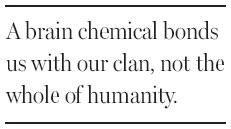The hormone of love appears to have its bounds

Oxytocin has been described as the hormone of love. This tiny chemical, released from the hypothalamus region of the brain, gives rat mothers the urge to nurse their pups, keeps male prairie voles monogamous and, even more remarkable, makes people trust one another more.
But new studies suggest oxytocin has limits. The love and trust it promotes are not toward the world, just toward a person's in-group. Psychologists, including Carsten K. W. De Dreu of the University of Amsterdam, have concluded it is the agent of ethnocentrism.
Dr. De Dreu decided on evolutionary principles that no one who placed unbounded trust in others could survive. Thus there must be limits on oxytocin's ability to induce trust.
Photo













